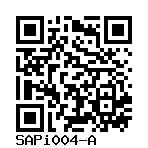ALS III, TDP43-A382T/A382T, ALS III-TDP43-A382T/A382T
SAPi004-A
General
Cell Line |
|
| hPSCreg name | SAPi004-A |
| Cite as: | SAPi004-A (RRID:CVCL_YI89) |
| Alternative name(s) |
ALS III, TDP43-A382T/A382T, ALS III-TDP43-A382T/A382T
|
| Cell line type | Human induced pluripotent stem cell (hiPSC) |
| Similar lines |
CBIGi022-A-1 (SOD1 I114T correction (CBIGi022-A), IPSC0029) Donor's gene variants: SOD1, SOD1 Donor diseases: Amyotrophic Lateral Sclerosis CBIGi049-A (IPSC0093, SOD1 I144T(CBIGi049-A)) Donor's gene variants: SOD1, SOD1 Donor diseases: Amyotrophic Lateral Sclerosis UCLi004-A (RCi173, RCFB60c6) Donor's gene variants: C9orf72, C9orf72 Donor diseases: Amyotrophic lateral sclerosis Frontotemporal dementia UCLi004-B (RCFB60c7, RCi177) Donor's gene variants: C9orf72, C9orf72 Donor diseases: Amyotrophic lateral sclerosis Frontotemporal dementia UCLi004-C (RCi172, RCFB60c2) Donor's gene variants: C9orf72, C9orf72 Donor diseases: Amyotrophic lateral sclerosis Frontotemporal dementia CBIGi010-A (SOD1 A4S, IPSC0014) Donor's gene variants: SOD1, SOD1 Donor diseases: Amyotrophic Lateral Sclerosis CBIGi011-A (SOD1 I114T, IPSC0015) Donor's gene variants: SOD1, SOD1 Donor diseases: Amyotrophic Lateral Sclerosis CBIGi014-A (VAPB A2V, IPSC0019) Donor's gene variants: VAPB, VAPB Donor diseases: Amyotrophic Lateral Sclerosis CBIGi022-A (IPSC0028, SOD1 I114T (CBIGi022-A)) Donor's gene variants: SOD1, SOD1 Donor diseases: Amyotrophic Lateral Sclerosis CBIGi024-A (IPSC0031, SOD1 I144T (CBIGi024-A)) Donor's gene variants: SOD1, SOD1 Donor diseases: Amyotrophic Lateral Sclerosis PFIZi013-A (RCi215, RCFB59 C9) Donor's gene variants: TARDBP, TARDBP Donor diseases: Amyotrophic lateral sclerosis |
| Last update | 20th November 2019 |
| User feedback | |
Provider |
|
| Generator |
Sapienza University of Rome (SAP)
Contact:
Sapienza University of Rome (SAP) |
| Owner | Sapienza University of Rome (SAP) |
| Distributors | |
| Derivation country | Italy |
External Databases |
|
| BioSamples | SAMEA6358473 |
| Cellosaurus | CVCL_YI89 |
| Wikidata | Q98129329 |
General Information |
|
| Publications |
|
| * Is the cell line readily obtainable for third parties? |
Yes Research use: allowed
Clinical use: not allowed
Commercial use: not allowed
|
Donor Information
General Donor Information |
|
| Sex | male |
Phenotype and Disease related information (Donor) |
|
| Diseases | A disease was diagnosed.
|
External Databases (Donor) |
|
| BioSamples | SAMEA6358474 |
Ethics
| Has informed consent been obtained from the donor of the embryo/tissue from which the pluripotent stem cells have been derived? | Yes |
| Was the consent voluntarily given? | Yes |
| Has the donor been informed that participation will not directly influence their personal treatment? | Yes |
| Can you provide us with a copy of the Donor Information Sheet provided to the donor? | No |
| Do you (Depositor/Provider) hold the original Donor Consent Form? | No |
| If you do not hold the Donor Consent Form, do you know who does? | Yes |
| Please indicate whether the data associated with the donated material has been pseudonymised or anonymised. | pseudonymised |
| Does consent explicitly allow the derivation of pluripotent stem cells? | No |
| Does consent prevent CELLS DERIVED FROM THE DONATED BIOSAMPLE from being made available to researchers anywhere in the world? | No |
| How may genetic information associated with the cell line be accessed? | No information |
| Will the donor expect to receive financial benefit, beyond reasonable expenses, in return for donating the biosample? | No |
| Has a favourable opinion been obtained from a research ethics committee, or other ethics review panel, in relation to the Research Protocol including the consent provisions? | Yes |
| Name of accrediting authority involved? | Comitato etico dell'azienda sanitaria ospedaliera |
| Approval number | 0008457 |
| Has a favourable opinion been obtained from a research ethics committee, or other ethics review panel, in relation to the PROPOSED PROJECT, involving use of donated embryo/tissue or derived cells? | No |
| For generation of the cell line, who was the supplier of any recombined DNA vectors or commercial kits used? |
hIPSC Derivation
General |
|
| Source cell type | |
Reprogramming method |
|
| Vector type | Integrating |
| Vector | Virus (Lentivirus) |
| Is the used vector excisable? |
Unknown |
| Absence of reprogramming vector(s)? |
Unknown |
| Reprogramming vectors silenced? |
Yes |
| Methods used |
RT-PCR
|
Vector free reprogramming |
|
Other |
|
| Selection criteria for clones | Morphology |
| Derived under xeno-free conditions |
No |
| Derived under GMP? |
No |
| Available as clinical grade? |
No |
Culture Conditions
| Surface coating | Matrigel/Geltrex |
| Feeder cells |
No |
| Passage method |
Enzymatically
Dispase
|
| O2 Concentration | 20 % |
| CO2 Concentration | 5 % |
| Medium |
Other medium:
Base medium: Nutristem-XF/FF
Main protein source: Serum concentration: % |
| Has Rock inhibitor (Y27632) been used at passage previously with this cell line? | Yes |
| Has Rock inhibitor (Y27632) been used at cryo previously with this cell line? | Yes |
| Has Rock inhibitor (Y27632) been used at thaw previously with this cell line? | Yes |
Characterisation
Analysis of Undifferentiated Cells
| Marker | Expressed | Immunostaining | RT-PCR | Flow Cytometry | Enzymatic Assay | Expression Profiles |
| TRA 1-60 |
Yes |
|
||||
| SSEA-4 |
Yes |
|
||||
| POU5F1 (OCT-4) |
Yes |
|
|
|||
| NANOG |
Yes |
|
Differentiation Potency
Genotyping
Karyotyping (Cell Line) |
|
| Has the cell line karyotype been analysed? |
No
|
Other Genotyping (Cell Line) |
|


Login to share your feedback, experiences or results with the research community.